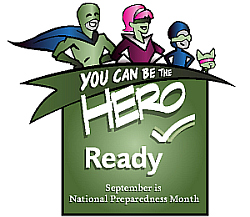 09/04/13 Marshall County’s Emergency Management Director, Clyde Avery is encouraging businesses and citizens to take action during September. He said, “The goal for this year’s National Preparedness Campaign is to increase the overall number of individuals, families and communities that engage in preparedness action at home, work, schools and place of worship.”
09/04/13 Marshall County’s Emergency Management Director, Clyde Avery is encouraging businesses and citizens to take action during September. He said, “The goal for this year’s National Preparedness Campaign is to increase the overall number of individuals, families and communities that engage in preparedness action at home, work, schools and place of worship.”
Regrettably, a lot of people still have the mindset that; “It won’t happen to them or their community.” The reality is that a disaster can strike at any time, any place, with little or no warning. Unfortunately some believe; “Whatever I do won’t make a difference in the event of a big disaster anyway.” The truth is that if a significant event takes place, emergency responders will be overwhelmed; they will not have the capability to reach everyone at once. Mobilizing additional help and resources will take time.
That is why being prepared is so important. Being responsible for knowing what to do before, during and after a disaster enables you to stay safe during the event and allows first responders to assist those in the greatest need.
You can be the hero. Neighbors helping neighbors during a disaster lessens the burden on first response personnel. Data shows 90 percent of disaster survivors are rescued by a neighbor. Talk to your neighbors and plan for how you will work together to ensure everyone stays safe in the event of an emergency.
The Marshall County Emergency Management Agency is encouraging all residents to take steps to prepare for emergencies by taking the following actions:
- Be Informed – Learn more about different threats that could affect your community and appropriate responses to them.
- Make a Plan – Plan in advance what you and your family will do in an emergency. Your plan should include a communications plan and address sheltering-in-place and evacuation.
- Get a Kit – Put together a kit of emergency supplies that will allow you and your family to survive for at least three days in the event an emergency happens. The kit should include basic items like water (1 gallon per day per person), food, battery-powered radio, flashlight, a first aid kit, extra medicine, cash, pet food, and season specific clothing.
- Get Involved – After preparing yourself and your family for possible emergencies, take the next step: get training in first aid and emergency response and get involved in preparing your community.
For more information on the types of disasters that are likely to occur in our area and additional preparedness information; contact the Marshall County Emergency Management Agency at 936-3740. Or you can follow us on Facebook @ Marshall County Emergency Management and twitter @EMA_Marshall














